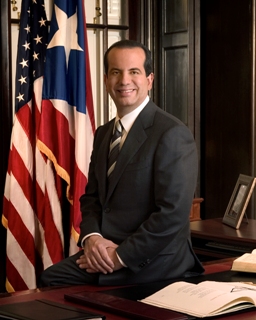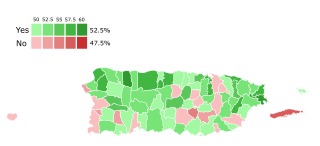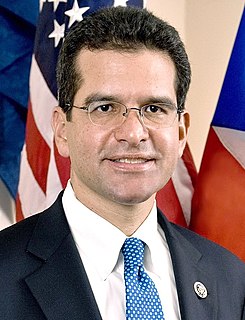The United States-Puerto Rico Political Status Act (1998) was a bill proposed in the United States Congress to help refine the political status of Puerto Rico. [1] The senior sponsor of the bill was Representative Don Young, Republican of Alaska. While a version was approved in the House, it failed to reach a vote in the Senate.
The bill offered Puerto Ricans four options for their political future: statehood, independence, associated republic, or the current commonwealth status. The project proposed to carry out a referendum in which the people of Puerto Rico could choose the option they preferred.
The proposal was controversial in Puerto Rican politics for several reasons. Governor Pedro Rosselló and Resident Commissioner Carlos Romero Barceló, two avid supporters of statehood, were advocates of the legislation, and thus the bill was seen with suspicion by non-statehooders. Second, the legislation seemed to favor unchangeable status choices over commonwealth status, and the Commonwealth option in the bill defined Puerto Rico as a "territory subject to the supreme powers of the U.S. Congress." The Popular Democratic Party of Puerto Rico (PPD) disagreed with this definition, stating that it portrayed the island as a colony of the United States, and not as a true commonwealth or free associated state (estado libre associado) between two nations. The PPD opposed the bill.
The positions regarding Puerto Rican status within the U.S. National Parties are not monolithic. Overall, the national Democratic Party identifies mostly with Commonwealth supporters, with minorities favoring statehood or independence. The Republican Party are also conflicted. Nearly every presidential candidate for the Republican party has endorsed statehood; but many legislators worry about the potential for a Spanish-speaking majority state of Puerto Rico to tip the balance of power in congress. Some welcome the fiscal benefits of detaching the island from the U.S.
The travails of H.R. 856 in the House of Representatives exemplifies the hurdles from conservative and liberal members that any status choice by Puerto Rico will face in Congress. [2] The bill was introduced by conservative representative Gerald Solomon (Republican – New York or R-NY). The following amendments, many by liberal NY and IL congressman were debated:
Ultimately, Puerto Rico, while under the PNP leadership of Governor Rosselló, held a status referendum on December, 1998, using criteria from the Bill, despite the lack of a Bill's approval. The PPD opposed the referendum unless different wording was used for the Commonwealth option. The PNP pointed out that any such status change would require congressional approval, and at least the Bill's terminology had mustered House support. In response, the PPD urged Puerto Ricans to choose the None of the Above option, as a means to reject the offered status choices. The success of this option in the polls while expressing disapproval, does not express a preference among the Bill's options.

The politics of Puerto Rico take place in the framework of a democratic republic form of government that is under the jurisdiction and sovereignty of the United States Congress as an organized unincorporated territory. Since the 1898 invasion of Puerto Rico by the United States during the Spanish–American War, politics in Puerto Rico have been significantly shaped by its status as territory of the United States. The nature of Puerto Rico's political relationship with the United States is the subject of ongoing debate in Puerto Rico, in the United States, the United Nations and the International Community, with all major political parties in the archipelago calling it a colonial relationship.

Pedro Juan Rosselló González, is a Puerto Rican physician and politician who served as the governor of Puerto Rico from 1993 to 2001. He was President of the New Progressive Party from 1991 to 1999 and 2003 to 2008, and served as Senator for the District of Arecibo from 2005 to 2008. His son, Ricardo was also Governor of Puerto Rico from 2017 to 2019.

The New Progressive Party is a political party in Puerto Rico that advocates statehood. The PNP is one of the two major parties in Puerto Rico with significant political strength and currently holds both the seat of the governor and of the resident commissioner.

The independence movement in Puerto Rico refers to initiatives by inhabitants throughout the history of Puerto Rico to obtain full political independence for the island, first from the Spanish Empire, from 1493 to 1898 and, since 1898, from the United States. A variety of groups, movements, political parties, and organizations have struggled for Puerto Rico's independence over the centuries.

The 2008 Puerto Rico gubernatorial election, took place on November 4, 2008 as part of the Puerto Rican general elections. It coincided with the 2008 United States general elections. Then-incumbent governor Aníbal Acevedo Vilá, Democratic, PPD was eligible for reelection, and ran for a second four-year term. His opponent, Luis Fortuño, Republican and PNP Resident Commissioner of Puerto Rico, defeated him. As of 2021, this is the last time a governor was elected in Puerto Rico by a majority instead of a plurality.

The Puerto Rico Democracy Act is a bill to provide for a federally sanctioned self-determination process for the people of Puerto Rico.

The statehood movement in Puerto Rico aims to make Puerto Rico a state of the United States. Puerto Rico is an unincorporated territorial possession of the United States acquired in 1898 following the Spanish–American War, making it "the oldest colony in the modern world". As of 2019, the population of Puerto Rico is 3.2 million, around half the average state population and higher than that of 20 U.S. states. Competing options for the future political status of Puerto Rico include maintaining its current status, becoming fully independent, or becoming a freely associated state. Puerto Rico has held six referendums on the topic. These are non-binding, as the power to grant statehood lies with the US Congress. The most recent referendum was in November 2020, with a majority (52.52%) of voters opting for statehood.

Aníbal Salvador Acevedo Vilá is a Puerto Rican politician and lawyer. He served as the governor of Puerto Rico from 2005 to 2009. He is a Harvard University alumnus and a graduate of the University of Puerto Rico School of Law, where he obtained his Juris Doctor degree. Acevedo Vilá has held various public service positions in the Puerto Rico government under the Popular Democratic Party, serving as a member of the House of Representatives of Puerto Rico (1993–2001) and as the 17th Resident Commissioner (2001–2005), before he was sworn in as Governor on 2 January 2005. Acevedo Vilá was also a member of the National Governors Association, the Southern Governors' Association and the Democratic Governors Association, and a collaborator of President Barack Obama's presidential campaign. Also he is currently an adjunct professor of the University of Puerto Rico School of Law. He unsuccessfully ran for Resident Commissioner of Puerto Rico in the 2020 elections for the Popular Democratic Party.

The political status of Puerto Rico is that of an unincorporated territory of the United States. As such, the island of Puerto Rico is neither a sovereign nation nor a U.S. state. Because of that ambiguity, the territory, as a polity, lacks certain rights but enjoys certain benefits that other polities have or lack. For instance, in contrast to U.S. states, Puerto Rico residents cannot vote in U.S. presidential elections nor can they elect their own senators and representatives to the U.S. Congress. On the other hand, in contrast to U.S. states, only some residents of Puerto Rico are subject to federal income taxes. The political status of the island thus stems from how different Puerto Rico is politically from sovereign nations and from U.S. states.

The Popular Democratic Party is a political party in Puerto Rico that advocates to continue as a Commonwealth of the United States with self-governance. The party was founded in 1938 by dissidents from the Puerto Rican Liberal Party and the Unionist Party and originally promoted policies on the center-left. In recent years, however, its leaders have described the party as centrist.
A referendum on the political status of Puerto Rico was held in Puerto Rico on November 6, 2012. It was the fourth referendum on status to be held in Puerto Rico. Puerto Rico has been an unincorporated territory of the United States since the Spanish–American War in 1898.
The proposed political status for Puerto Rico encompasses the different schools of thought on whether Puerto Rico, currently an unincorporated territory of the United States in the form of a commonwealth, should change its current political status. Although there are many differing points of view, there are four that emerge in principle: that Puerto Rico maintains its current status, becomes a state of the United States, becomes fully independent, or becomes a freely associated state.

The free association movement in Puerto Rico refers to initiatives throughout the history of Puerto Rico aimed at changing the current political status of Puerto Rico to that of a sovereign freely associated state. Locally, the term soberanista refers to someone that seeks to redefine the relationship between Puerto Rico and the United States to that of a compact with full sovereignty. The term is mostly used in reference to those that support a compact of free association or a variation of this formula, commonly known as Estado Libre Asociado (ELA) Soberano, between Puerto Rico and the United States. Members of the independence movement that are willing to pursue alliances with this ideology are occasionally referred to as such, but are mostly known as independentistas. Consequently, soberanismo then became the local name for the free association movement.
Three main alternatives are generally presented to Puerto Rican voters during a Puerto Rico political status plebiscite: full independence, maintenance or enhancement of the current commonwealth status, and full statehood into the American Union. The exact expectations for each of these status formulas are a matter of debate by a given position's adherents and detractors. Puerto Ricans have proposed positions that modify the three alternatives above, such as (a) indemnified independence with phased-out US subsidy, (b) expanded political but not fiscal autonomy, and (c) statehood with a gradual phasing out of federal tax exemption.
The Territories Clause of the United States Constitution allows for Congress to "dispose of" Puerto Rico and allow it to become independent of the U.S. or, under the authority of the Admissions Clause for it to be admitted as a state of the United States.
A referendum on the political status of Puerto Rico was held in Puerto Rico on June 11, 2017. The referendum had three options: becoming a state of the United States, independence/free association, or maintaining the current territorial status. Those who voted overwhelmingly chose statehood by 97%. This figure is attributed to a boycott led by the pro-status quo PPD party, which resulted in a 22.93% turnout.

During the last decades of the 20th century, the concept of sovereign free association was mostly promoted by members of the liberal wing of the Popular Democratic Party (PPD). During the 1990s, the option first appeared in a ballot as part of the second political status referendum held during the Pedro Rosselló administration.

A referendum of the status of Puerto Rico was held on November 3, 2020, concurrently with the general election. The Referendum was announced by Puerto Rico Governor Wanda Vázquez Garced on May 16, 2020. This was the sixth referendum held on the status of Puerto Rico, with the previous one having taken place in 2017. This was the first referendum with a simple yes-or-no question, with voters having the option of voting for or against becoming a U.S. state. The New Progressive Party (PNP), of whom Vázquez is a member, supports statehood, while the opposition Popular Democratic Party (PDP) and Puerto Rican Independence Party (PIP) oppose it.

The 2020 Puerto Rican general elections was held on November 3, 2020 to elect the officials of the Puerto Rican government who will serve from January 2021 to January 2025, most notably the position of Governor and Resident Commissioner. In addition, there was also a non-binding status referendum to ask voters if Puerto Rico should become the 51st state of the Union.
A special election to elect shadow senators and shadow representatives from Puerto Rico was held on May 16, 2021. Voters chose two special delegates to the United States Senate and four special delegates to the United States House of Representatives. Their work is to demand that the US Congress respect and enforce the results of the 2020 status referendum, and admit Puerto Rico as the 51st state of the Union.